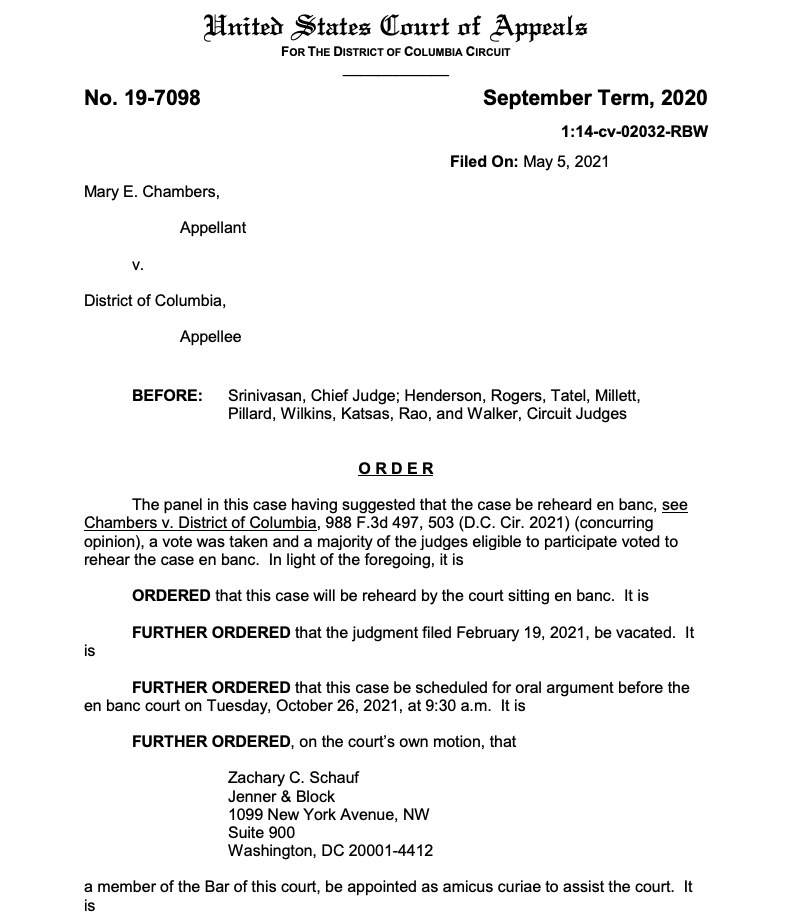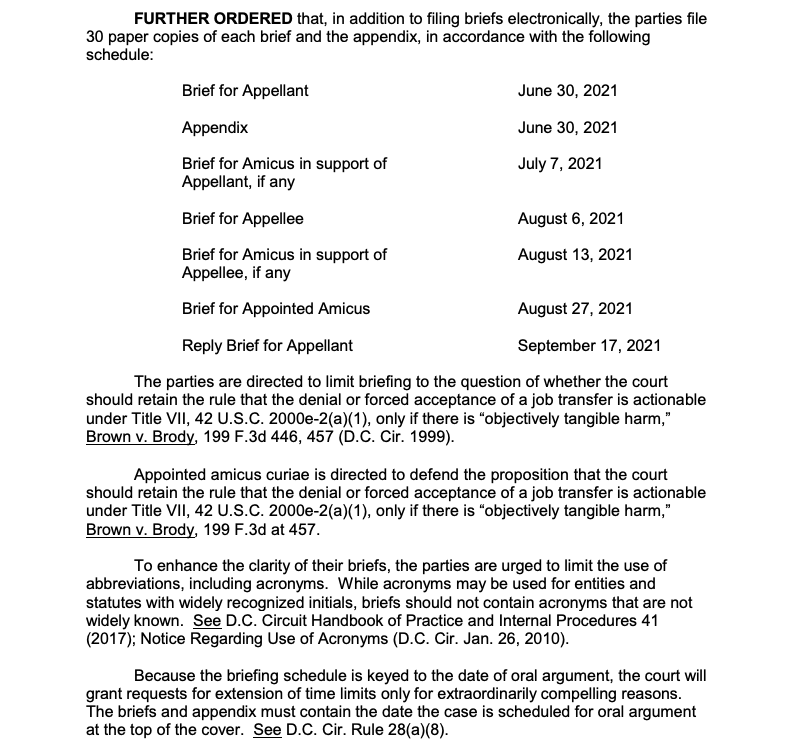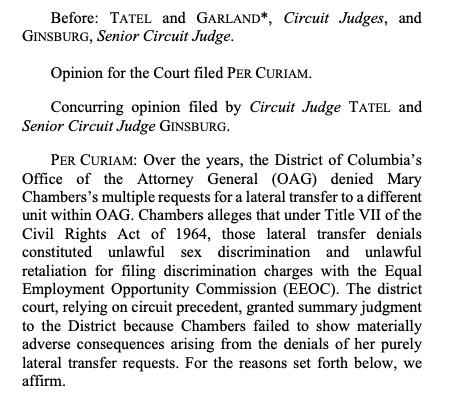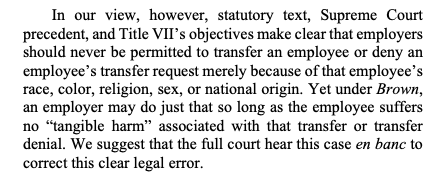D.C. Circuit Review – Reviewed: An Unusual En Banc Order
This week, the D.C. Circuit issued an en banc order:


If you are interested in what this case is about, here is how the panel decision begins:

The concurring opinion by Judges Tatel and Ginsburg, in turn, says:

Interesting.
Because the subject has been on my mind, however, I want to focus on the appointment of an amicus.
En banc cases are (relatively) rare in the D.C. Circuit. Even so, I have never seen the D.C. Circuit appoint an amicus in an en banc case. So I asked the good folks in the BYU Law library to see if there are other examples.* This is what they came up with:
- United States v. Jones, 997 F.2d 1475 (D.C. Cir. 1993) (en banc) (“A.J. Kramer, Washington, DC (appointed by this Court) as amicus curiae on behalf of appellant.”)
- United States v. Ash, 461 F.2d 92 (D.C. Cir. 1972) (en banc) (“It is fortunate for appellant that the issues concerning identification were raised in the brief filed by his appointed counsel before appellant sought and was granted leave to continue pro se. The points raised by appellant pro se have no merit. But we find merit in the issues as to identification raised in the brief filed by counsel, continued by this court on an amicus curiae basis.”)
- United States v. Brawner, 471 F.2d 969 (D.C. Cir. 1972) (en banc) (“After the case was argued to a division of the court, the court sua sponte ordered rehearing en banc. We identified our intention to reconsider the appropriate standard for the insanity defense, authorized counsel to file supplemental briefs, invited the Public Defenders’ Service ‘to submit an additional brief on behalf of the appellant,’ and appointed William H. Dempsey, Jr., Esq., as amicus curiae, without instruction as to result or theory, ‘to research the authorities on the issue of criminal responsibility,’ to advise the court thereon and to present oral argument.'”)
- United States v. Brown, 461 F.2d 134 (D.C. Cir. 1971) (en banc) (“Mr. Jerome J. Dick, Washington, D.C. (appointed by this court) as amicus curiae.”)
- Irby v. United States, 390 F.2d 432 (D.C. Cir. 1967) (en banc) (“The problems in this area are not easy. It was for this reason that the court en banc decided to seek the views of a disinterested amicus curiæ. There has been forthcoming, as a result of this appointment, a very helpful brief which has supplied us with useful research information, as well as with imaginative reflections upon the judicial approach most cognizant of both the public and private interests involved. Amicus has concluded that the rule of lenity has a very limited utility indeed as a touchstone of the propriety of consecutive sentences. He suggests that it be abandoned in favor of a supervisory rule to the effect that consecutive sentences may not be imposed for offenses arising out of a single course of conduct unless the sentencing judge (1) finds from the facts that the defendant was not motivated by a single intent and objective, and (2) recites his reasons for believing that consecutive sentences are necessary to achieve at least one of the recognized sentencing goals.”)
- Harris v. United States, 370 F.2d 477 (D.C. Cir. 1966) (en banc) (“Mr. Dennis G. Lyons, Washington, D.C., appointed by this court as amicus curiæ on behalf of appellant.”)
- Frady v. United States, 348 F.2d 84 (D.C. Cir. 1965) (en banc) (“After submission of the cases to the court en banc a majority of the court requested memoranda on the following questions: (1) the adequacy of the poll; (2) whether or not 22 D.C.Code § 2404 requires the presentation of specific evidence to the jury bearing on punishment, and if so, by what procedure or at what point in the proceedings should such information be given; and (3) the judgment this court should render, dependent upon the answer to the foregoing questions. Counsel was appointed as amicus curiæ to assist the court in these matters. After memoranda were filed, and at the request of the United States, the cases were reargued to the court en banc. We express our special indebtedness to amicus curiæ for his memorandum and argument, as well as to counsel for appellants and to the United States Attorney.”)
- Blocker v. United States, 274 F.2d 572 (D.C. Cir. 1959) (en banc) (“Mr. Francis J. Ortman, Washington, D.C. (appointed by this Court as amicus curiae) urged reversal.”)
- Stewart v. United States, 247 F.2d 42 (D.C. Cir. 1957) (en banc) (“Messrs. Abraham Krash and William Lawrence McGovern, Washington, D.C., (both appointed by this Court as amici curiae) filed a brief urging reversal.”)
- Smither & Co. v. Coles, 242 F.2d 220 (D.C. Cir. 1957) (en banc) (“Messrs. David G. Bress and Leonard Braman, Washington, D.C. (both appointed by this Court), filed a brief as amici curiae, urging affirmance.”)
- Kephart v. Kephart, 193 F.2d 677 (D.C. Cir. 1951) (en banc) (“Prior to the rehearing before the full court, we appointed John H. Burnett, Esq., and Jean M. Boardman, Esq., as amici curiae and requested them to discuss these questions: ‘(a) did the trial court properly refuse to hold the husband in contempt and (b) did it have authority to remit the unpaid installments which had accrued to the wife under the divorce decree which stands without modification?’ We also requested the amici curiae ‘to present briefs fully discussing the question of the merit of the decision in Franklin v. Franklin.’ Pursuant to our request, Messrs. Burnett and Boardman, working separately, filed exhaustive briefs and participated in the extensive oral argument of this cause. Both reached the conclusion and argued to us that the District Court has no authority to remit unpaid installments of alimony which have matured under a divorce decree which has not been modified, and that our decision in Franklin v. Franklin should be overruled. The court is indebted to the amici curiae for their able and helpful contributions.”)
Who doesn’t love the history of the D.C. Circuit? And needless to say, I am confident that Zachary Schauf will ably discharge his responsibilities.
* I’m happy to update this list if there are more examples. Also, I did my best to identify the appointed lawyer through internet searches. Apologies if I flagged the wrong person; it wasn’t always easy to identify the correct individual based on a name.
D.C. Circuit Review – Reviewed is designed to help you keep track of the nation’s “second most important court” in just five minutes a week every once in a while.



